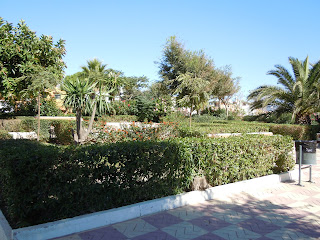This past week has been about adjusting to the new time zone, food choices, language, and culture. It has not been an easy adjustment. And I am only partially there. I think I have finally adjusted to the time difference. I can sleep at night now. The key, is sleep on the way there. Don't allow yourself to nap, and you will be tired enough upon arrival to be able to fall asleep at night. At least in theory, that sounds good, but I was up until 4 or 5 every morning for a few nights unable to sleep and adjust to all of the differences. The food is not as bad of a change as I expected. I live on the Atlantic Ocean coast. This area is known for its tuna, and its wine. The wine I like, not so much the tuna. They do something to it that just isn't right. But I have had a lot of other types of sea food and have enjoyed them. They eat at much different times than I am used to. Breakfast is whenever you wake up, typically in Andalucia, it includes coffee and toast with oil and tomatoes. Around noon, there is a break where they have another cup of coffee and a small snack. Lunch is the main meal of the day primarily served from 1-3 followed by a siesta, where everything is shut down until about 6 again. There is an evening snack around 6 or 6:30 which is another cup of coffee and a small snack. Cena, or supper (or dinner, depending on what you call it), is around 10:30. It is common here to eat a salad, or a sandwich. Something small to get you through the night. It took a while to get used to, but now I have adjusted to that as well. But am still not quite as brave to try a lot of the food they have around this area.
The language is still a challenge, but it is amazing how well my abilities have improved in a week. I can get around much better, and now that I have learned correct vocabulary for day-to-day activities and learned to talk
with a lisp and to "eat" my "s's". I can now be understood much, much better. Even though, people in Andalucia speak very fast and I still have a hard time following everything that is said.
Culturally, I think may be the hardest change to adjust to. The concept of time, understanding of the details, dependence on technology, clothing, etc is much different. In the school, I am expected to be there at 9, and no later. But if I was going to meet someone for a cup of coffee, 9 probably means 9:30 or 10. Americans are so used to being rushed, being stressed, and working towards the future, where Spaniards are much more preoccupied with personal relationships. Last night, I went down the the beach, with a lot of different cafes and sat with a friend. Mostly, we people watched, but we arrived around 6. We left at 11, when it was still crazy busy and almost every table at every cafe was full. But not just adults, children are out until at least 10. There are pick-up games of futbol (soccer) everywhere. That sport is so ingrained in the Spanish, it is no wonder their fandom and enthusiasm at winning this years World Cup. You can tell who is an American, because we are the ones who are on their phones, or are dragging their computers with them. The Spanish are not preoccupied with technology. I rarely have seen a computer besides my own, anywhere. Even my school has a very limited number of computers. No technology is in classrooms except a chalkboard and cd player. You never see someone is public on their phones, where it has become common place in the US to see phone use in public. Or going to lunch, and texting others the entire time. This is not the way in Spain, they focus on the person in front of them, not on those away from them. That is going to be the hardest adjustment to make. I already am used to no phone, it is too expensive to use, and I can't figure out how to text anyway. But I rely on my computer. Something to survive in this culture, I need to ween myself away from. But that is by far easier said than done. I like contact with people from home. But eventually I will need to adjust completely, get rid of the technology addiction, and live the Spanish life.









